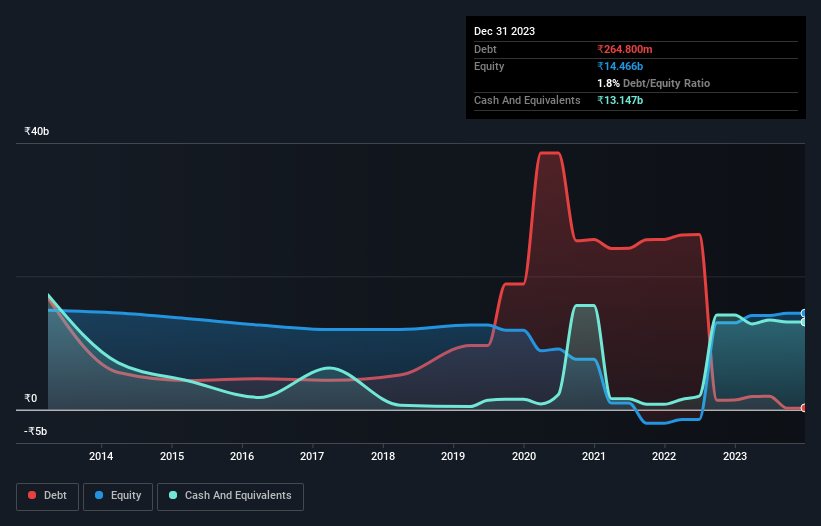
David Iben put it well when he said, 'Volatility is not a risk we care about. What we care about is avoiding the permanent loss of capital.' So it seems the smart money knows that debt - which is usually involved in bankruptcies - is a very important factor, when you assess how risky a company is. We note that MMTC Limited (NSE:MMTC) does have debt on its balance sheet. But should shareholders be worried about its use of debt?
When Is Debt Dangerous?
Debt assists a business until the business has trouble paying it off, either with new capital or with free cash flow. Ultimately, if the company can't fulfill its legal obligations to repay debt, shareholders could walk away with nothing. While that is not too common, we often do see indebted companies permanently diluting shareholders because lenders force them to raise capital at a distressed price. Of course, the upside of debt is that it often represents cheap capital, especially when it replaces dilution in a company with the ability to reinvest at high rates of return. When we think about a company's use of debt, we first look at cash and debt together.
Check out our latest analysis for MMTC
What Is MMTC's Debt?
The image below, which you can click on for greater detail, shows that MMTC had debt of ₹264.8m at the end of September 2023, a reduction from ₹1.45b over a year. However, its balance sheet shows it holds ₹13.1b in cash, so it actually has ₹12.9b net cash.

How Healthy Is MMTC's Balance Sheet?
We can see from the most recent balance sheet that MMTC had liabilities of ₹19.2b falling due within a year, and liabilities of ₹474.6m due beyond that. On the other hand, it had cash of ₹13.1b and ₹1.40b worth of receivables due within a year. So its liabilities outweigh the sum of its cash and (near-term) receivables by ₹5.12b.
Of course, MMTC has a market capitalization of ₹99.8b, so these liabilities are probably manageable. However, we do think it is worth keeping an eye on its balance sheet strength, as it may change over time. Despite its noteworthy liabilities, MMTC boasts net cash, so it's fair to say it does not have a heavy debt load! The balance sheet is clearly the area to focus on when you are analysing debt. But it is MMTC's earnings that will influence how the balance sheet holds up in the future. So if you're keen to discover more about its earnings, it might be worth checking out this graph of its long term earnings trend.
In the last year MMTC had a loss before interest and tax, and actually shrunk its revenue by 86%, to ₹7.1b. That makes us nervous, to say the least.
So How Risky Is MMTC?
While MMTC lost money on an earnings before interest and tax (EBIT) level, it actually booked a paper profit of ₹1.3b. So taking that on face value, and considering the cash, we don't think its very risky in the near term. With revenue growth uninspiring, we'd really need to see some positive EBIT before mustering much enthusiasm for this business. There's no doubt that we learn most about debt from the balance sheet. But ultimately, every company can contain risks that exist outside of the balance sheet. Be aware that MMTC is showing 3 warning signs in our investment analysis , you should know about...
At the end of the day, it's often better to focus on companies that are free from net debt. You can access our special list of such companies (all with a track record of profit growth). It's free.
New: Manage All Your Stock Portfolios in One Place
We've created the ultimate portfolio companion for stock investors, and it's free.
• Connect an unlimited number of Portfolios and see your total in one currency
• Be alerted to new Warning Signs or Risks via email or mobile
• Track the Fair Value of your stocks
Have feedback on this article? Concerned about the content? Get in touch with us directly. Alternatively, email editorial-team (at) simplywallst.com.
This article by Simply Wall St is general in nature. We provide commentary based on historical data and analyst forecasts only using an unbiased methodology and our articles are not intended to be financial advice. It does not constitute a recommendation to buy or sell any stock, and does not take account of your objectives, or your financial situation. We aim to bring you long-term focused analysis driven by fundamental data. Note that our analysis may not factor in the latest price-sensitive company announcements or qualitative material. Simply Wall St has no position in any stocks mentioned.
About NSEI:MMTC
MMTC
Operates as a trading company in Asia, Europe, Africa, the Middle East, Latin America, and North America.
Adequate balance sheet with questionable track record.
Similar Companies
Market Insights
Community Narratives




